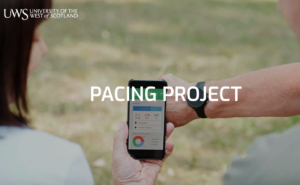The University of the West of Scotland are running a study to investigate the effectiveness of adaptive pacing on Long-COVID.
Long-COVID symptoms often get much worse after activity. Adaptive pacing (AP) is a way for people with long-COVID to manage their day-to-day rest and activity. AP means people must balance what they plan to do with how much energy they feel they have. This is not always easy because the amount of activity that will cause symptoms to worsen is different for everyone. Also, it can be necessary for people with long-COVID to adapt how they use AP to match their current symptoms. To do this, individuals must track their activity (perhaps for several days), which can be challenging, particularly if poor memory is also a symptom.
With help from people with long-COVID, we have developed an approach to make AP easier. This approach uses activity trackers (in this case, Fitbit activity trackers) to monitor the participant’s activity. We can then use the information from the trackers to help make pacing easier and more effective.
Adaptive Pacing (AP) has been found to help similar conditions to long-covid such as ME/CFS. So far, the study has recruited around sixty participants who largely reside in and around the central belt and ideally we would now like to recruit those further north, particularly from Moray because of high cases numbers during the peak of the pandemic.







